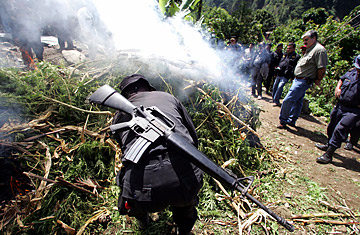
Marijuana plants are burned during an anti-drug operation in Guatemala.
Just as Mexico lives in the shadow of the U.S., Guatemala lives in the shadow of Mexico. To its southern neighbor Mexico has exported its ranchera music, its soap operas, its tacos and now, its narco violence — as if Guatemala didn't have enough of its own.
Drug-related violence in Guatemala has become increasingly savage over the past two years as powerful Mexican cartels battle each other and Guatemalan traffickers for control over what has become a key link in the cocaine route from Colombia to the United States. The most recent battle, on Nov. 30, left at least 17 dead when a shootout broke out near the Guatemala-Mexico border. Last March, 11 men died in a shootout at a rural recreation spot. And those are just the events that made headlines; experts say there have been, and will be, more. "Frankly, I think it's going to get a loss worse," says Bruce Bagley, chair of the International Studies department at the University of Miami. (See the Top 10 Underreported Stories of 2008
The spike in drug-violence in Guatemala coincides with the crackdown on organized crime in Mexico, which that country's president, Felipe Calderon, declared two years ago upon taking office. Since then gnarly murders and vicious turf wars have broken out in both Mexico and Guatemala, as traffickers seek to reposition their operations. Mexican cartels are also looking to control routes along the highly porous Guatemala-Mexico border and elsewhere in Central America. "Now there's an all-out struggle to see who gets to dominate this link in the drug trafficking chain," says Bagley. The contenders include Mexico's two dominant drug enterprises — the Sinaloa and Gulf cartels, along with their Guatemalan partners.
The spoils are huge. "We estimate about 400 metric tons of cocaine are moving through the Central American corridor, meaning most of it would go through Guatemala," says U.S. Ambassador to Guatemala, Stephen McFarland. That makes for a business worth over $7 billion, based on the National Drug Intelligence Center's estimated average wholesale price of cocaine in Los Angeles.
Experts say Guatemala is no longer a mere drug corridor, but rather an essential and highly lucrative pit stop on the road north. One Guatemalan columnist likened the country's new role to a "privateering port." Julio Godoy, former vice-minister of security in Guatemala's interior department, called Guatemala "one big warehouse" for drugs. More and more Mexicans with suspected drug links are turning up in Guatemala. "They're clearly here essentially to establish themselves and to take on rivals," says ambassador McFarland.
The recreation area shootout last March seemed to pit Guatemalan trafficker, Juan Jose "Juancho" Leon Ardon, linked to the Gulf cartel, against members of the Sinaloa cartel, believed to be led by Mexican drug boss, Joaquin "El Chapo" Guzman Loera. Local newspapers reported that Leon Ardon and his group had stolen a drug shipment from the Sinaloa cartel, which then allegedly sought vengeance by killing Leon Ardon and 10 of his men. The 12th victim was Arturo Damian Casanova, a Mexican national and suspected member of the Sinaloa cartel. In April, the Guatemalan police detained Mexican national Daniel "El Cachetes" Perez Rojas, considered one of the founders of the Gulf cartel's notorious mercenary force, the "Zetas". He is accused of participating in the previous month's shootout.
The most recent drug battle broke out during a horse race in the tiny village of Agua Zarca, less than an hour's drive from the busy Mexico-Guatemala border crossing at La Mesilla. Authorities found nearby what appeared to be an improvised hospital for the wounded, including an impromptu helicopter pad with evidence of use. Six people have been arrested in connection with the incident, four of them Mexican and at least one a Guatemalan, with an outstanding arrest warrant for drug-related crimes.
Corruption, impunity, the backdrop of violence since the country's brutal civil war that stretched from the 1960s into the '90s and a well-entrenched organized crime network make Guatemala fertile ground for the narcotics business. A series of weak, infiltrated governments have been unable or unwilling to reverse the tide. "People perceive a breakdown of authority and really the authorities are the traffickers," says ambassador McFarland. In areas of high drug activity, the population has little choice but to align itself with the traffickers, says Godoy, the former Guatemalan Interior Ministry official. Plus, in a country where some 80% of citizens live below the poverty line, traffickers pay well for cooperation. "If [a trafficker] asks a person to shine a light at a [clandestine] airstrip and they're going to pay more than that person has earned all year, it's likely they'll do it," says Godoy.
The current administration of President Alvaro Colom has focused its first year on social programs aimed at reducing poverty, while security issues have taken a back seat. However, analysts say Colom has taken steps in recent months to clean up and strengthen security forces and the justice system. Rember Larios, adjunct director of the national civil police, says the force was committed to facing the drug threat. "Our hand will not tremble," says Larios, noting that police were carrying out searches for traffickers and evidence in provinces with heavy narco presence. McFarland says the Guatemalan government's expanded budget for security next year was a positive sign. "My feeling is that the leaders of the government are aware that 2009 really is a sort of make or break year."
